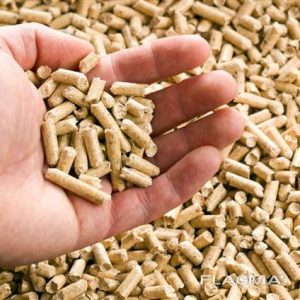Soft Wood Pellets VS Hard Wood Pellets
Softwood pellets and hardwood pellets are two different types of biomass fuels that are used in pellet stoves and boilers. Both types of pellets have their own unique characteristics and benefits.
Softwood pellets are made from softwood species, such as pine, spruce, or fir, which are typically less dense than hardwood species. Softwood pellets are generally less expensive than hardwood pellets and have a lower ash content. They also tend to produce less heat per unit, which means they may not be suitable for heating larger spaces or buildings.
Hardwood pellets, on the other hand, are made from hardwood species, such as oak, maple, or cherry, which are denser than softwoods. Hardwood pellets burn hotter and longer than softwood pellets, making them ideal for heating larger spaces or buildings. They also produce less ash and emit a pleasant aroma when burned.

When deciding between softwood and hardwood pellets, it is important to consider your heating needs, budget, and personal preferences. Softwood pellets may be a good choice if you are looking for an affordable fuel source for a small space, while hardwood pellets may be a better option if you need to heat a larger space or prefer a hotter, longer burn. Ultimately, the choice between softwood and hardwood pellets will depend on your specific circumstances and requirements.
Advantages of Hardwood pellets
Hardwood pellets have several advantages as a fuel source that make them a popular choice for heating homes, commercial buildings, and industrial applications. Here are some of the advantages of hardwood pellets:
- High Energy Density: Hardwood pellets have a higher energy density than other biomass fuels, such as softwood pellets or wood chips. This means they contain more energy per unit, which results in a longer burn time and a more efficient use of fuel.
- Clean Burning: Hardwood pellets produce very little ash and emissions compared to traditional fossil fuels, such as oil or gas. This makes them a more environmentally friendly option for heating and reduces the risk of air pollution.
- Sustainable: Hardwood pellets are made from sustainably sourced wood, which means they are a renewable and carbon-neutral fuel source. Using hardwood pellets can help reduce reliance on non-renewable energy sources and lower carbon emissions.
- Consistent Quality: Hardwood pellets are manufactured to strict quality standards, ensuring a consistent product that burns evenly and efficiently. This makes them a reliable and predictable fuel source for heating systems.
- Easy to Store and Transport: Hardwood pellets are available in bags or bulk shipments and can be easily stored in a dry, cool location. They are also compact and lightweight, making them easy to transport and handle.
Overall, hardwood pellets offer a range of benefits that make them an attractive fuel source for a variety of heating applications. Their high energy density, clean burning properties, sustainability, consistent quality, and ease of storage and transport make them a popular choice for those looking for an efficient and environmentally friendly heating solution.
Advantages of softwood pellets
Softwood pellets also have several advantages as a fuel source that make them a popular choice for heating. Here are some of the advantages of softwood pellets:
- Lower Cost: Softwood pellets are generally less expensive than hardwood pellets, making them an affordable fuel source for those on a budget.
- High BTU Output: Softwood pellets have a high BTU (British Thermal Units) output, which means they produce a lot of heat per pound. This makes them a suitable fuel source for heating smaller spaces or for supplemental heating.
- Lighter Weight: Softwood pellets are typically lighter in weight than hardwood pellets, making them easier to handle and transport.
- More Widely Available: Softwood trees, such as pine and spruce, are more abundant than hardwood trees, making softwood pellets more widely available and accessible.
- Low Ash Content: Softwood pellets produce less ash than hardwood pellets, which means less cleaning and maintenance is required.
Overall, softwood pellets offer a range of advantages that make them a viable fuel source for heating. Their lower cost, high BTU output, lighter weight, wider availability, and low ash content make them a practical choice for those looking for an efficient and cost-effective heating solution.